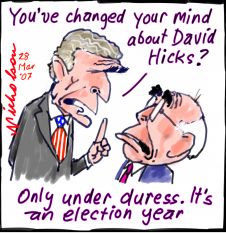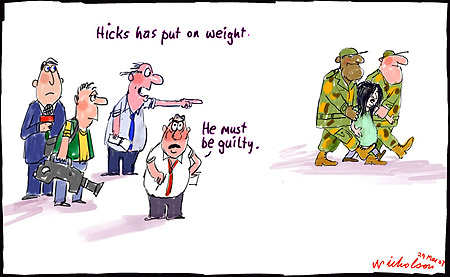
Playing along with the criminal United Stupids government in order to come home to Asstralia post haste, Hicks has acquiesced to a laughable token 9 month sentence in addition to time already served, with a total 7 year sentence, provided he shuts his mouth for a year and withdraws claims he was mistreated by the torturing septics.
He will serve his time in Australia under a plea deal and must arrive in Australia before May 29, 2007.
This means he’ll be free at the end of December 07, after the next federal election. The rodent will be able to lie that he has supported a Asstralian citizen’s rights whilst protecting the infantile Whorestralian public from the Hicks menace.
Terry Hicks however pointed out that
his son was forced to undergo a plea-bargain and his case was never properly tested in court.
“Nobody will ever know what the evidence was.”
 And that’s how opaque, dictatorial regimes like it.
And that’s how opaque, dictatorial regimes like it.
Greens leader, Bob Brown foresees the action to come:
“However the minute Hicks arrives in Australia, our legitimate justice system kicks into action. It may hold some nasty shocks for the Howard government which has endorsed this illegal process at Guantanamo Bay.”
Hicks is bound by the “court” orders consequent to his plea bargain which have been strongly criticised by civil rights lawyers:
They were especially critical of the order forbidding Hicks from protesting any mistreatment, saying such a requirement would be unconstitutional in a civilian US court.
“If the United States were not ashamed of its conduct, it wouldn’t hide behind a gag order,” said Ben Wizner, staff lawyer for the American Civil Liberties Union.
“The agreement says he wasn’t mistreated. Why aren’t we allowed to judge for ourselves?”
 Terry Hicks commented
Terry Hicks commented
“The Americans made David sign a paper to say he was never abused… when we knew he has been – David told us.”
…
Mr Hicks said David would have to think about whether he would want to tell his story.
“Once David’s home he’ll have time to think about that,” he said.
“Who knows, he may want to change his mind.”
We can but hope so … we can be pretty certain the rodent will attempt to capitalise on a silenced Hicks’ misfortunes to boost his woeful electoral position.






Hicks’s pre-trial agreement (full transcript)
UNITED STATES V DAVID MATTHEW HICKS
Offer for a Pretrial Agreement
Date: 26 March 2007
1. I, David Matthew Hicks, am presently the accused under a military commissions charge that was sworn on February 2, 2007, and referred to trial on March 1, 2007. I have read the charge and specifications alleged against me, and they have been explained to me by my detailed military defense counsel, Major Michael D. Mori, and my civilian defense counsel, Mr Joshua L Dratel. I understand the charge and specifications, and am aware that I have a legal right to plead not guilty and to leave upon the United States the burden of proving my guilt beyond a reasonable doubt by legal and competent evidence. Understanding the above and under the conditions set forth below, and in consideration of the Convening Authority’s agreement to approve a sentence in accordance with the limitations set forth in Appendix A, I offer to plead as follows:
To Specification 1 of the Charge and the Charge: Guilty
I understand that this offer, when accepted by the Convening Authority, will constitute a binding agreement. I assert that I am, in fact guilty of the offense to which I am offering to plead guilty, and I understand that this agreement absolves the United States of its obligation to present any evidence in court to prove my guilt. I offer to plead guilty, freely and voluntarily, because I am guilty, and because it will be in my best interest that the Convening Authority grant me the relief set forth in Appendix A. I understand that I waive my right to avoid self-incrimination insofar as a plea of guilty will incriminate me.
2. Furthermore, upon acceptance of this offer by the Convening Authority:
a. I agree that I will enter into a reasonable stipulation of fact with the United States to support the elements of the offenses to which I am pleading guilty.
b. I agree that I will not communicate with the media in any way regarding the illegal conduct alleged in the charge and the specifications or about the circumstances surrounding my capture and detention as an unlawful enemy combatant for a period of one (1) year. I agree that this includes any direct or indirect communication made by me, my family members, my assigns, or any other third party made on my behalf.
c. I agree that as a material term of this agreement I will cooperate fully, completely and truthfully in post-trial briefings and interviews as directed by competent United States or Australian law enforcement and intelligence authorities. I agree to provide truthful, complete and accurate information and, if necessary, truthful, complete and accurate testimony under oath at any grand juries, trials or other proceedings, including military commissions and international tribunals. I understand that if I testify untruthfully in any material way I can be prosecuted for perjury. I further agree to provide all information concerning my knowledge of, and participation in al Qaeda, Lashkar-e Tayyiba (LET), or any other similar organizations. I agree that I will not falsely implicate any person or entity, and I will not protect any person or entity through false information or omission.
d. I hereby assign to the Government of Australia any profits or proceeds which I may be entitled to receive in connection with any publication or dissemination of information relating to the illegal conduct alleged in the charge sheet. This assignment shall include any profits and proceeds for my benefit, regardless of whether such profits and proceeds are payable to me or to others, directly or indirectly, for my benefit or for the benefit of my associates or a current or future member of my family. I hereby represent that I have not previously assigned, and I agree that I will not circumvent this assignment to the Government of Australia by assigning the rights to my story to an associate or to a current or future member of my family, or to another person or entity that would provide some financial benefit to me, to my associates, or to a current or future member of my family. Moreover, I will not circumvent this assignment by communicating with an associate or a family member for the purpose of assisting or facilitating his or her profiting from a public dissemination, whether or not such an associate or other family member is personally or directly involved in such dissemination. I agree that this assignment is enforceable through the Australian Proceeds Act of 2002, and any other applicable provision of law that would further the purpose of this paragraph’s prohibition of personal enrichment for myself, my family, or my heirs and assigns, through any publication or dissemination of qualifying information, and I acknowledge that my representations herein are material terms of this agreement.
3. In making this offer, I state that:
a. I am satisfied with my detailed military defense counsel, Major Michael D. Mori, and my civilian defense counsel, Mr Joshua L Dratel, who have advised me with respect to this offer, and I consider them competent to represent me in this military commission and agree that they have provided me effective assistance of counsel.
b. No person or persons have made any attempt to force or coerce me into making this offer or to plead guilty. This is a free and voluntary decision on my part made with full knowledge of its meaning and effect.
c. My counsel have fully advised me of the nature of the charge and specifications against me, the possibility of my defending against them, any defense that might apply, and the effect of the guilty plea that I am offering to make. I fully understand the advice of my defense counsel and the meaning, effect, and consequences of this plea.
d. I understand that the signature of the Convening Authority to this offer and to Appendix A, or to any modified version of Appendix A which I also sign, will transform this offer into an agreement binding upon me and the United States.
e. I understand and agree that the Convening Authority can withdraw from this agreement and this agreement will become null and void, in the event that:
1. I fail to plead guilty as required by this agreement;
2. The commission refuses to accept my plea of guilty to any charge;
3. The commission sets aside my plea of guilty for whatever reason, including upon my request, before sentence is announced; or
4. I fail to satisfy any material obligation or term of this agreement, or I have misrepresented any material term of this agreement.
5. I fail to agree to a satisfactory stipulation of fact with the prosecution related to the charge and specification to which I plead guilty.
f. I understand and agree that, if this agreement becomes null and void for any reason, my offer for this plea agreement cannot be used against me in any way at any time to establish my guilt of the charge alleged against me, the United States may prosecute the charge and specifications alleged against me, and the limitations upon the disposition of my case set forth in Appendix A will have no effect.
g. I understand and agree that my failure to fully cooperate with Australian or United States authorities may delay my release from confinement or custody under applicable provisions of Australian law.
h. I acknowledge and agree that I am an alien unlawful enemy combatant, as defined by the Military Commissions Act of 2006, Title 10, United States Code, Section 948 (c).
i. I have never been illegally treated by any person or persons while in the custody and control of the United States. This includes the period after my capture and transfer to US custody in Afghanistan in December 2001, through the entire period of my detention by the United States at Guantanamo Bay, Cuba. I agree that this agreement puts to rest any claims of mistreatment by the United States.
j. I further understand and agree that the entire period of detention as an unlawful enemy combatant is based upon my capture during armed conflict, has been lawful pursuant to the law of armed conflict and is not associated with, or in anticipation of, any criminal proceedings against me.
4. In exchange for the undertakings made by the United States in entering this Pretrial Agreement, I voluntarily and expressly waive all rights to appeal or collaterally attack my conviction, sentence, or any other matter relating to this prosecution whether such a right to appeal or collateral attack arises under the Military Commissions Act of 2006, or any other provision of United States or Australian law. In addition, I voluntarily and expressly agree not to make, participate in, or support any claim, and not to undertake, participate in, or support any litigation, in any forum against the United States or any of its officials, whether uniformed or civilian, in their personal or official capacities with regard to my capture, treatment, detention, or prosecution.
5. I agree that for the remainder of my natural life, should the Government of the United States determine that I have engaged in conduct proscribed by Sections 950q through w. of Chapter 47A of title 10, United States Code, after the date of the signing of this Pretrial Agreement, the Government of the United States may immediately invoke any right it has at that time to capture and detain me, outside the nation of Australia and its territories, as an unlawful enemy combatant. If I engage in conduct proscribed by Sections 950q through w. of Chapter 47A of title 10, United States Code, after the date of the signing of this Pretrial Agreement and during the period in which any part of my sentence is suspended, the Convening Authority may vacate any period of suspension agreed to in this Pretrial Agreement or as otherwise approved by the Convening Authority and the previously suspended portion of my sentence could be imposed on me. This pretrial agreement resolves all charges against me under the Military Commissions Act of 2006 and United States law that may have occurred before the signing of this agreement.
6. This document and Appendix A include all of the terms of this Pretrial Agreement and not other promises or inducements have been made by the Convening Authority or any other person which affect my offer to plead guilty or enter into this Pretrial Agreement.
(Signed)
David Matthew Hicks (Accused)
26/3/07
We certify that we provided David Matthew Hicks the advice referred to above and explained to him the elements of the offenses to which he is pleading guilty, and that he has voluntarily signed this offer for pretrial agreement.
(Signed)
Michael D Mori, Major, USMC, 26 Mar 07
Joshua L Dratel, Civilian Defense Counsel, 26 Mar 07
I recommend acceptance of this offer.
Morris D Davis, Colonel, USAF, Chief Prosecutor, 26 Mar 07
I recommend acceptance of this offer.
Thomas L Hemingway, Brig Gen, USAF, Legal Advisor to the Convening Authority, 26 Mar 07
The foregoing instrument, including Appendix C, concerning David Matthew Hicks, dated March 26, 2007, is approved and accepted.
Susan J Crawford, Convening Authority, 26 Mar 2007
The LA Times reveals
The Australian is coming out against Howard. Good sign of the tables having turned. Its editorial today states
Again in the Australian today, David Flint, emeritus professor of law and ex ABC Board chairman, whilst missing the legal subtleties captured in the LCA opinion and having no appreciation of the human rights issues involved with Hicks’ incarceration, adds his voice to the throng:
If Flint’s understanding is shared by most other conservative Whorestralian jurists, the rodent now has a serious mutiny on his hands.
Howard denies input into Hicks’ sentence and gagging:
Hicks may well have grounds on which to appeal on his return to Whorestralia. Here’s the legal opinion of the Law Council of Australia on his chances.
If the US Supreme Court again declares the military kangaroo courts invalid, Hicks’ sentence will be null and void.
All the Whorestralian state Attorney Generals pressure the revolting Ruddock to sign the Fremantle Declaration.